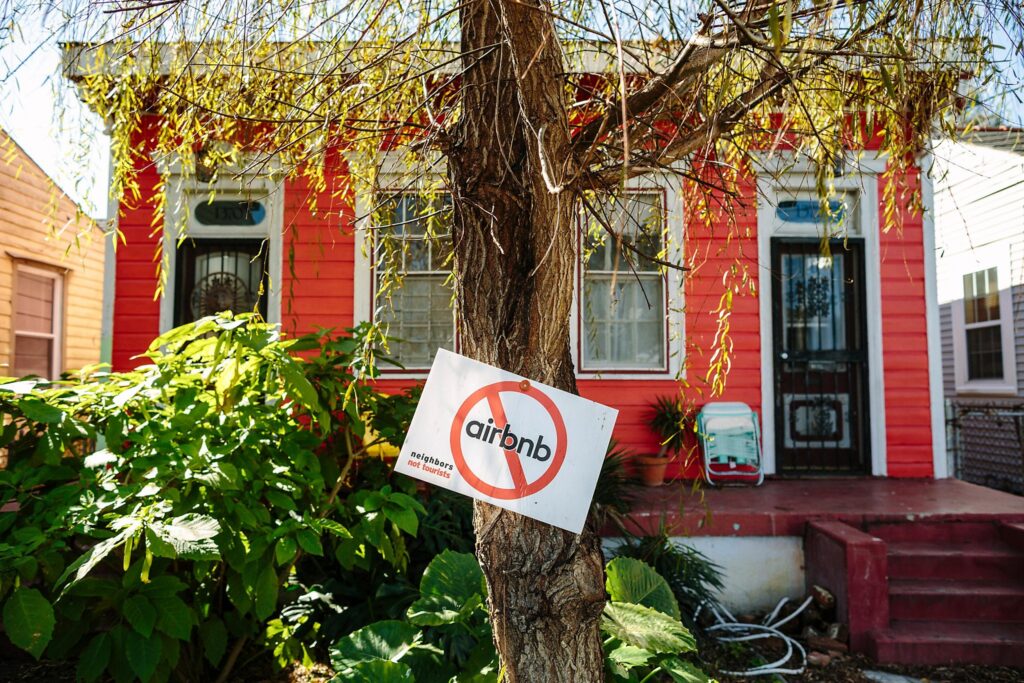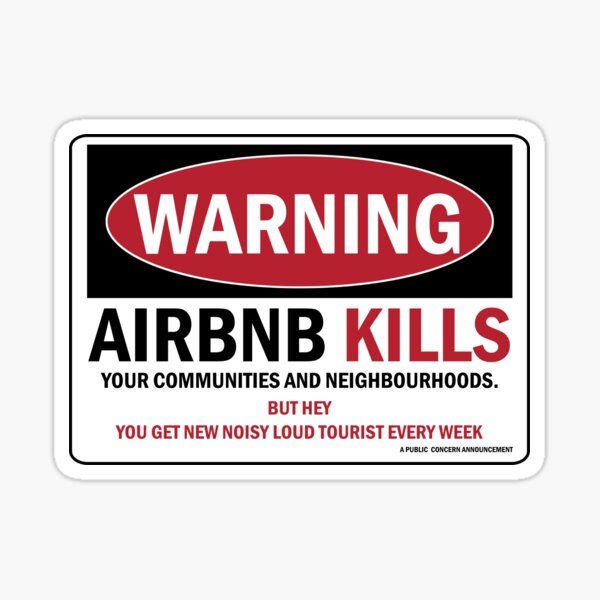In recent years, Airbnb has revolutionized the travel and lodging industry, offering unique accommodations and experiences worldwide. While the platform has undoubtedly democratized travel and created opportunities for homeowners, a closer examination reveals that Airbnb has become a contentious force, often likened to a “cancer” for neighborhoods. Its effects on local economies and communities, both immediate and long-term, are increasingly coming under scrutiny.
The Immediate Effects on Communities
1. Housing Affordability Crisis
One of the most pressing issues linked to Airbnb is its impact on housing affordability. In many cities, short-term rentals have exacerbated the housing crisis. Property owners, enticed by the higher profitability of short-term rentals, are converting long-term rental units into vacation accommodations. This shift reduces the availability of affordable housing for local residents, driving up rental prices and making it difficult for average-income individuals and families to find homes.
2. Neighborhood Displacement
The influx of short-term renters in traditionally residential areas often leads to displacement. Long-term residents, faced with soaring rents and a shifting neighborhood character, are forced to move. This displacement disrupts community cohesion, eroding the social fabric that once defined these neighborhoods. The transient nature of Airbnb guests also contributes to a loss of local identity, as communities become dominated by short-term visitors rather than long-term residents.

3. Increased Noise and Disturbances
Airbnb properties, often located in once-quiet residential areas, can lead to significant disturbances. Many short-term renters exhibit disrespectful and careless behavior, disregarding the norms and peace of the neighborhood. This lack of consideration manifests as loud parties, frequent noise complaints, and general disruptions, all of which contribute to a decline in the quality of life for long-term residents. The transient nature of Airbnb guests often exacerbates these issues, as the guests’ sense of entitlement and lack of accountability can further strain relations within the community.
4. Strain on Local Services
Short-term rentals can strain local services and infrastructure. Increased foot traffic and the turnover of guests place added pressure on public amenities, such as waste management and public transportation. Local governments and service providers may struggle to keep up with the additional demands, leading to degraded services for all residents.
The Long-Term Consequences
1. Economic Impact on Local Businesses
Contrary to the notion that Airbnb supports local businesses, the long-term economic impact is often detrimental. Many Airbnb guests prefer to frequent tourist-oriented businesses rather than patronize local shops, restaurants, and services. This preference can lead to a decline in the economic health of small, locally-owned businesses that are integral to the character and economy of a neighborhood. Over time, this shift can erode the unique charm of these areas, turning them into generic tourist traps.
2. Impact on Community Identity
As neighborhoods become increasingly dominated by transient visitors, the sense of community and local identity suffers. The essence of a neighborhood—its culture, history, and local interactions—diminishes as short-term rentals replace long-term residents. This loss of identity can result in a homogenized and less vibrant community atmosphere, where local traditions and values are overshadowed by commercial interests.
3. Regulatory and Legal Challenges
The rise of short-term rentals has not only sparked numerous regulatory and legal battles but has also exposed questionable practices among some local officials. Many cities have struggled to implement effective regulations to manage the proliferation of Airbnb properties. The challenge is compounded by the involvement of mayors and city officials whose private, often questionable, practices may facilitate the growth of short-term rental corporations.
Local governments face significant difficulties in regulating short-term rentals due to the rapid expansion and complex nature of the industry. Zoning laws, safety standards, and taxation rules must be adapted to address the unique challenges posed by platforms like Airbnb. However, many municipalities have found their efforts thwarted by legal loopholes and resistance from property owners and the platform itself.
Compounding these difficulties are the questionable practices of some mayors and local officials. In certain instances, these officials have been found to engage in practices that seem to benefit short-term rental corporations at the expense of local regulations and community well-being. These practices can include granting permits for large-scale short-term rental developments, bypassing zoning laws, or failing to enforce existing regulations.
The involvement of these officials in enabling the expansion of short-term rental businesses often comes under scrutiny. Allegations of favoritism, corruption, or conflicts of interest may arise when officials who have personal or financial ties to the short-term rental industry are seen as lax in enforcing regulations. This lack of oversight allows for the development of large numbers of new properties specifically designed for short-term rental, further exacerbating issues related to housing affordability and neighborhood disruption.
4. Gentrification and Inequality
Airbnb’s influence can accelerate gentrification, where wealthier individuals and investors drive up property values and living costs, pushing out lower-income residents. This process can lead to increased socioeconomic inequality, as the original, often marginalized, residents are displaced by more affluent newcomers. The result is a further entrenchment of economic divides and a reduction in affordable housing options.
Community Reactions to Negligent Municipalities
In response to the growing frustration with negligent municipalities and the detrimental effects of short-term rentals, some communities have resorted to drastic measures. The inaction of local governments, coupled with ineffective regulation and enforcement, has driven residents to take matters into their own hands, sometimes with alarming consequences.
Rising Frustrations and Community Action
As local authorities have struggled to address the negative impacts of short-term rentals—such as noise, disturbances, and housing shortages—residents have increasingly felt abandoned by the systems designed to protect them. This sense of neglect has led to a range of community-driven actions aimed at reclaiming their neighborhoods and restoring their quality of life.
Examples of Escalation
In several cases, these actions have escalated into confrontations and violence. In one notable instance, a community in a major city faced so many disturbances from Airbnb properties that residents organized a protest. Initially a peaceful demonstration, the situation deteriorated when tensions flared between protestors and short-term rental guests, resulting in physical altercations and property damage.
In another case, residents who felt that local officials were complicit in the expansion of short-term rentals took direct action by targeting the properties themselves. This included acts of vandalism, such as graffiti and property damage, intended to draw attention to the perceived negligence of local authorities and the negative impacts of the rentals.

Underlying Issues and Consequences
These drastic measures highlight the deep-seated frustration and desperation of residents who feel that their concerns are ignored. The actions, while driven by genuine grievances, often lead to further conflict and legal repercussions. The violence and vandalism not only escalate tensions but also risk undermining the legitimacy of the residents’ arguments and their cause.
Furthermore, the escalation of community actions can create a hostile environment that makes it even harder to achieve constructive dialogue and effective solutions. It underscores the urgent need for municipalities to address the regulatory gaps and enforcement issues that fuel such conflicts.









